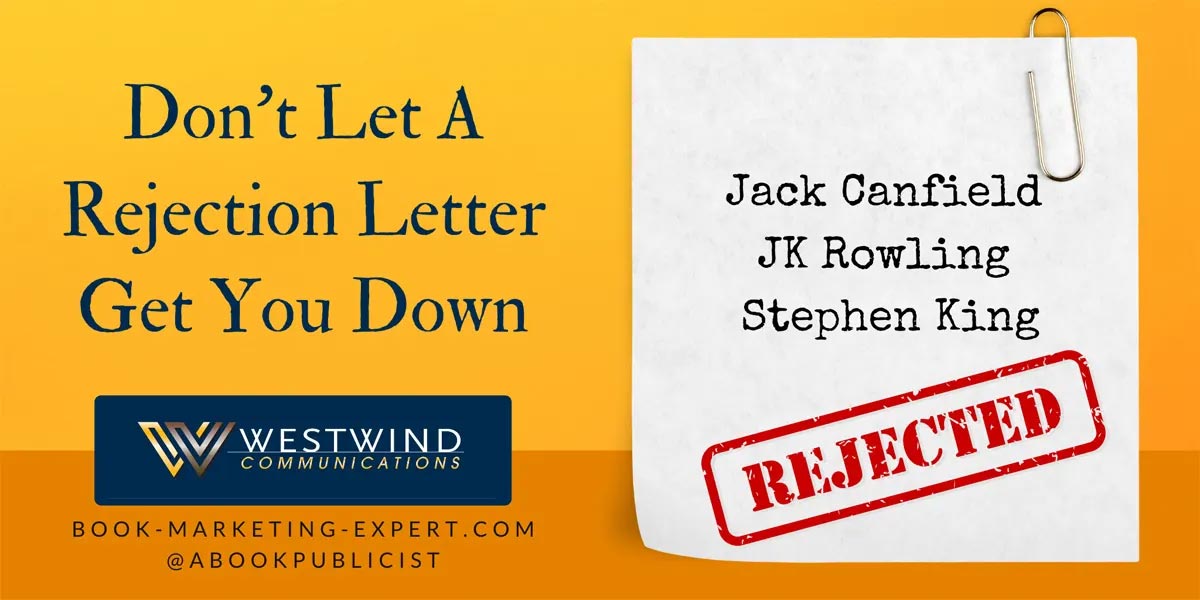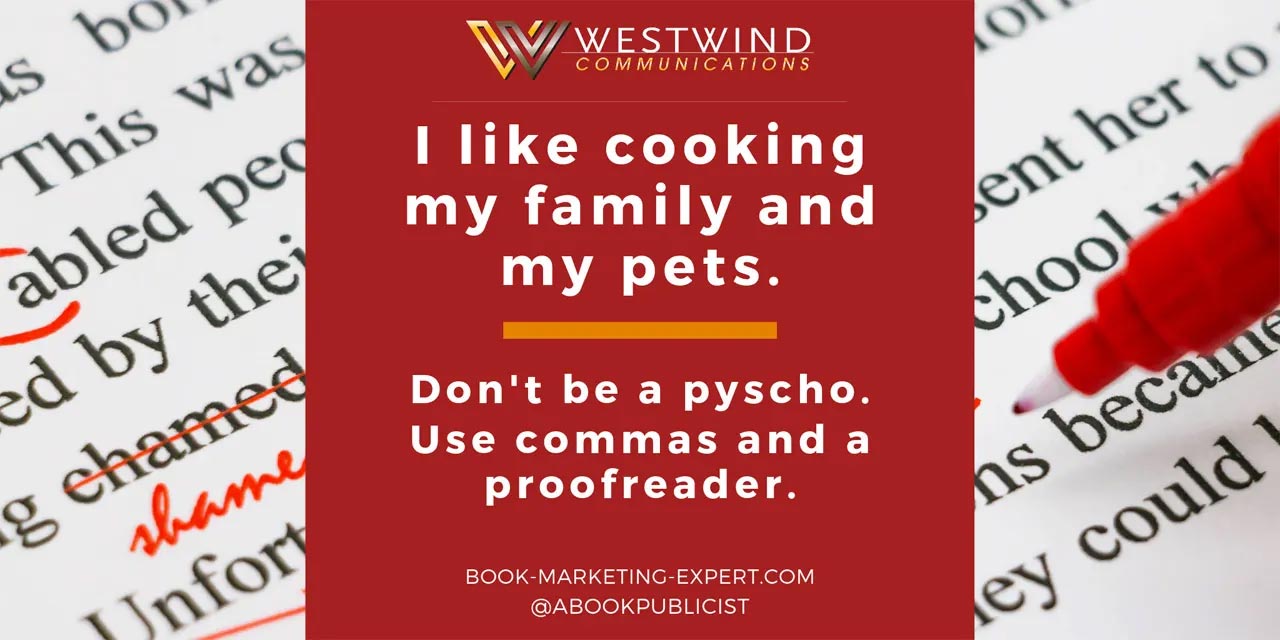Authors: Don’t Let a Rejection Letter Get You Down!

By Scott Lorenz
Westwind Book Marketing
Getting a rejection letter hurt. I know because I deal with authors all the time, and I have seen first-hand how it can take its toll on the confidence and motivation of an author.
The harsh truth is most writers will face some form of rejection throughout their writing career, and even some of the greatest writers of our time had to deal with rejection letters.
A list of well-known authors who were rejected by publishers
I have put together a list of well-known authors who were rejected by publishers but went on to become immensely successful. Some of the names on this list may really surprise you.
1. J. K. Rowling:
A few years ago, J.K. Rowling posted rejection letters on Twitter that she received for her first novel, ‘The Cuckoo’s Calling’, a book written under her pseudonym, Robert Galbraith. “I wasn’t going to give up until every single publisher turned me down, but I often feared that would happen,” says Rowling. The book was eventually published and the author then went on to write ‘Harry Potter and the Philosopher’s Stone’, which was also initially rejected, this time by 12 publishers. When the book was finally published, however, it sold more than 120 million copies. The famous Harry Potter series has now sold more than 500 million copies worldwide, becoming the best-selling series of all time!
2. Stephen King:
Stephen King was told: “We are not interested in science fiction which deals with negative utopias. They do not sell.” for his book debut novel ‘Carrie’, which was rejected by 30 publishers. Later in his career, these rejections would inspire him to write some of his best-selling works. In his book ‘On Writing’, Stephen King says he pinned every single rejection letter he had received to his wall with a nail, “By the time I was fourteen, the nail in my wall would no longer support the weight of the rejection slips impaled upon it. I replaced the nail with a spike and went on writing.” Today, the best-selling author has published 63 books and sold more than 350 million copies.
3. Vladimir Nabokov:
Over a five-year period, forty editors declined the offer to publish ‘Lolita’. In his book ‘The Making of a Bestseller’, Arthur T Vanderbilt mentions that one publisher said to Vladimir: “I recommend that it be buried under a stone for a thousand years.” Yet when the book was eventually published it became a literary sensation.
4. Jack Canfield:
Canfield’s book, “Chicken Soup for the Soul” got rejected by 144 publishers! The book went on to become a bestseller. As of date, the series has sold more than 500 million books. Canfield said: “If we had given up after 100 publishers, I likely would not be where I am now. I encourage you to reject rejection. If someone says no, just say NEXT!”.
5. Dr Seuss:
For his first story, ‘And to think I saw it on Mulberry street’, Dr Seuss was rejected by 27 publishers. “Too different from other juveniles on the market to warrant its selling”, one letter said. Luckily, the author did not give up and continued to write. Today, his books have made over 300 million sales, and the author is considered one of the best-selling fiction authors of all time.
It is easy for writers to wallow in self-doubt and pity after receiving rejection letters from publishers or agents. That fear can be powerful, and it can deter writers from doing what they love. Sometimes, it can even be the reason they give up on their writing dreams altogether. I hope this list can help inspire you to keep writing and not give up.
It’s also easy to forget that writing a book is an incredible accomplishment, and the undertaking itself deserves great commendation. Receiving rejection letters doesn’t mean your book has failed or that it won’t succeed. Fortunately, there are steps you can take to improve the chances of your book becoming successful. If you have finished writing your book, make sure it’s properly edited and proofread before sending it out to publishers. Editing, copyediting, and proofreading can truly make your book shine.
Once your book has finished the editing stage, the next step is to market it appropriately. This stage can prove pivotal for success. Check out my article on how you can generate buzz around your book to help your book get the attention it deserves. Another important element of book marketing that is overlooked at times is the author website. I have previously compiled a list of top author websites which you can use as inspiration to design your own.
The Bottom Line: Receiving a rejection letter shouldn’t be the reason you give up on your writing dreams. Be inspired by the successful authors above who used rejection as fuel to keep going.
Receiving a #rejectionletter shouldn’t be the reason you give up on your #writing dreams. Be inspired by the successful #authors above who used rejection as fuel to keep going. Click to tweet this article to your friends and followers! 𝕏About Book Publicist Scott Lorenz
Book publicist Scott Lorenz is President of Westwind Communications, a public relations and marketing firm that has a special knack for working with authors to help them get all the publicity they deserve and more. Lorenz works with bestselling authors and self-published authors promoting all types of books, whether it’s their first book or their 15th book. He’s handled publicity for books by CEOs, CIA Officers, Navy SEALS, Homemakers, Fitness Gurus, Doctors, Lawyers and Adventurers. His clients have been featured by Good Morning America, FOX & Friends, CNN, ABC News, New York Times, Nightline, TIME, PBS, LA Times, USA Today, Washington Post, Woman’s World, & Howard Stern to name a few.
Learn more about Westwind Communications’ book marketing approach at https://www.WestwindBookMarketing.com or contact Lorenz at [email protected] or 734-667-2090 or fill out the form below. Follow Lorenz on Twitter @aBookPublicist. Want help titling a book? Check out Scott Lorenz’s new award winning, bestselling book: Book Title Generator- A Proven System in Naming Your Book www.BookTitleGenerator.net.
Would you like help promoting your book?
If so, tell us a little about your book. What is the title? Do you have a publisher? What is the publish date? How many pages is your book? What is the cost? Do you have web site? What is your specific goal I.E., to make money, raise awareness, get the attention of an agent or publisher, sell the story to a movie or TV studio or something else?
Submit the form below with this information and we’ll get back to you as soon as possible. Thank you!



